I remember coming home from school, walking through the gate, past the yew bushes and down the walkway past the open den windows. The aroma of the trinity (onions, bell peppers and celery) simmering in the roux would grab me. I could smell the sausage, and sometimes even the shrimp. There was something else earthy that I couldn’t identify.
Perhaps it was the filé, or the thyme. Perhaps it was the blend of everything “getting happy” together in the pot.
Or maybe it was just the love. Rosie put a lot of love in her gumbo.
As a child growing up in New Orleans, these were some of the root smells of my evolution. Red beans and rice. Shrimp creole. And Rosie’s gumbo.
Rosie took care of me when both my parents worked. She also helped my mom around the house. They were best friends. They frequently discussed the latest events on the afternoon soap operas…”The Young and the Restless,” “The Guiding Light”…all that crap. And they confided in each other. They supported each other through some heavy life challenges.
Rosie was the one I’d go to when I was sick. Unlike mom, who had plenty to say on a variety of topics, Rosie was more quiet, saying only what she needed to say, and usually, saying it very directly.
Truth be told, when I was less than 10 years old, I picked out the andouille and smoked sausage, the ham and the shrimp from her gumbo and left the rest. It wasn’t until my teens and early 20s that I truly started to appreciate the magic. It wasn’t until my early 30s that I had the courage to ask her to teach me how to make it.
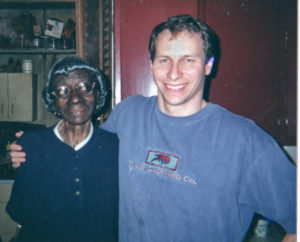
Chef and apprentice. I must have had a good lesson. No visible spoon marks.
I was not afraid of her teaching me a recipe. My mom was an excellent cook, and she taught me how to follow a recipe. She taught me to have the courage to try new things and learn from my mistakes.
The daunting prospect of trying to learn how to cook without a recipe scared the hell out of me. Rosie cooked by instinct. The “recipe” was in her head, a tradition passed down over generations. And gumbo isn’t quite as simple as mac and cheese.
During the two-plus-year process of learning how to make gumbo, my relationship with Rosie grew more profound and more meaningful than we could have imagined. That’s probably because it was an intense experience requiring no shortage of patience from both of us.
She taught me to use all five senses. But it was the process of trying to create a common language that I could understand that proved most challenging.
“First you make the roux,” she’d say. “Get a spoon of oil and a spoon of flour and stir it in the hot pan.”
“How big a spoon?”
“The wooden spoon in your hand.”
“But how much is in that? What if I don’t have a spoon exactly this size?”
WHACK!
The spoon found the side of my head and I didn’t ask that question again.
“You want the roux to be the color of milk chocolate before you add the trinity.”
“What color of milk chocolate? I like a lot of chocolate in my chocolate milk.”
WHACK!
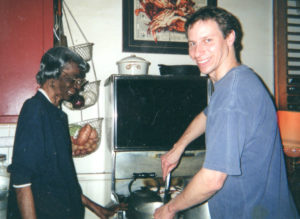
Stir the roux, boy…
Two years and several such reprimands later, I must have taken enough lumps to start to get the hang of it. She taught me to watch the roux until it was LIGHT milk chocolate color; to listen to the sound of the roux as it set up; to smell the nuttiness as it approached the right stage before adding the trinity. I learned to smell that sweet, earthy smell of the vegetables sweating in the roux. I felt the density of the roux ball as I stirred it to make sure not to burn the flour. After adding the water and stock, I learned to taste it to gauge how much salt and pepper to add. I learned the timing of when to add the sausage, shrimp, and other ingredients.
I remember nervously handing over a bowl that I made entirely on my own for her to judge.
“You done good.”
Graduation
I’ve made gumbo many, many times since my formative learning. Before each time, I thank Rosie for showing me how to do it right. Because of her tutelage, I’m now able to scale my gumbo up or down in volume based on the scope of the audience. I can make it with different ingredients. In October, I made gumbo for a chef friend’s wedding using seafood from the Gulf of Maine. I made a lobster stock, added mussels and clams and lobster, and I smoked a skate wing. I added some phenomenal andouille. It went over well.
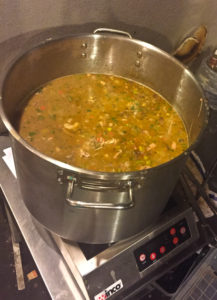
Making roux on an induction burner was nerve racking. What would Rosie think?
I just recently made more than 90 quarts for the Tremé Creole Gumbo Festival held Nov. 18 and 19 in New Orleans. Dana Honn, colleague, friend and chef/co-owner of Café Carmo in New Orleans invited me down after seeing that I cooked a lot of gumbo at Slow Food Nations in Denver this summer.
Gumbo Fest was a blast. It was exhausting. I think I cooked or helped stage and take down the booth for something like 36 hours over three days. I learned much from Dana and his crew. I learned about what it takes to sell your food. I learned more about what I can do (making gumbo on an induction burner!).
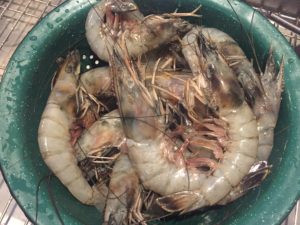
Such a treat to cook with wild caught Gulf of Mexico seafood!
But the highlight for me wasn’t just the end product, or the enthusiastic response from some customers, or the stellar Gulf of Mexico shrimp and crabs from friend Lance Nacio’s Anna Marie Shrimp, or the otherworldly andouille, chaurice and tasso from my friend and pig whisperer Toby Rodriguez.
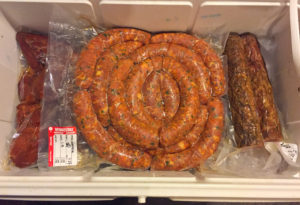
Got pork? Toby’s products are the best I’ve ever cooked with.
No, the real highlight for me occurred during a panel discussion I was moderating on gumbo heritage and the idea of preserving the tradition of local, sustainable sourcing. On the panel with me were Dana, friend and colleague Gary Granata, who has travelled the world to discover how different people deal with changing waterways, and Ryan Prewitt, chef/partner of the highly acclaimed Pesche Seafood Grill in New Orleans.
We each had a different take on the importance of sourcing your food (whether or not for gumbo) locally from producers you know or from sources you know who take care of their products. We talked about how gumbo is and was a communal event, dating back centuries to West African roots. You don’t cook gumbo for one person. Traditionally, neighbors would bring something to throw into the pot, or something to go with the gumbo.
Toward the end of the discussion, I asked each panelist to talk about his first, most powerful memory of gumbo.
Naturally, I spoke about Rosie. About that smell in the house and the yard. About taking my lumps. About the sense of family around her and her family. About teaching her grandson Gary how to bang on the drums. About the pride I felt in watching him grow and eventually march with one of the best high school bands during Mardi Gras. About the profound sadness of her death in the mid 90s. About the heartbreak of losing track of Gary and his mom Betty after Katrina hit. His home was boarded up with a big X painted on the door by the National Guard.
We tried FEMA. We tried the sheriff’s department. For months I went online checking displaced victims websites. Nothing. We didn’t know if they were alive and had evacuated, … or not.
Just before I’d reached this part of my narrative, a family of four came into the audience and sat down. I mentioned that a month prior to Gumbo Fest, I’d been planning to make gumbo for my chef friend’s wedding, and was thinking about Rosie, as always, and about Gary and his mom, when I got a Facebook message.
It was from Gary.
Fighting to keep my composure in front of the festival audience, I said “Gary, would you please come up here? I just want you all to know that I haven’t seen this person in 20 years, and I hadn’t heard from him until last month.”
We hugged, tears in our eyes, for it had been a long time of not knowing.
It was a seminal moment for both of us for Gary and his family to taste the gumbo his grandmother taught me to make. I often wonder what Rosie would think of my gumbo now that I’ve adapted it to my own particular style.
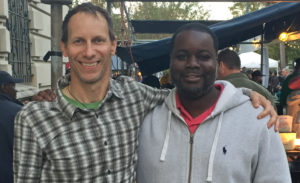
Gumbo truly is a community event. It brings people together. At the outset of the discussion, I told the audience that for me, the most important ingredient isn’t the roux, or the trinity or okra. (There’s often a vocal battle line drawn between the okra crowd, and the file/roux crowd in Louisiana). It’s love. You’ve got to love the food first. And it’s also important to love the people you’re cooking for. You and they will taste the difference.
This perhaps is the most important lesson I’ve learned as a home cook.
Thanks, mom. Thanks, Rosie.
